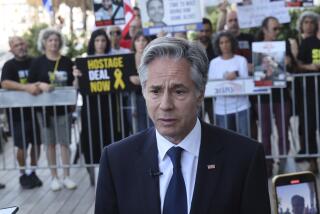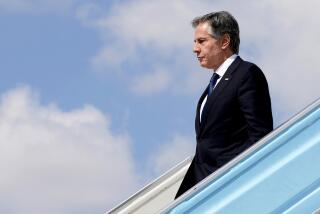U.N. Ambassadors Balk at Bosnia Safe-Areas Plan : Balkans: Venezuelan envoy calls U.S.-European proposal ‘completely wrong.’ The secretary general may reconvene a peace conference.
WASHINGTON — Although the Clinton Administration predicted U.N. Security Council approval by next week, several impassioned ambassadors continued to balk Friday at the U.S.-European plan for safe areas for the Muslims in Bosnia-Herzegovina.
Venezuelan Ambassador Diego Arria said the plan, announced by Secretary of State Warren Christopher and the foreign ministers of Russia, Britain, France and Spain in Washington last Saturday, had deformed the original proposal of Arria and four other ambassadors for declaring the town of Srebrenica a safe area a month ago to save it from imminent destruction.
“What we created for an emergency situation has become a model that is completely wrong,” he said by phone from U.N. headquarters.
As a result of the impasse, Secretary General Boutros Boutros-Ghali may reconvene a peace conference in London to try yet again to negotiate a new peace settlement for Bosnia, his spokesman, Joe Sills, said at his daily news briefing in New York. According to news reports, the United States, Britain and France oppose reconvening the conference lest it do little more than expose the fissures in American-European unity on the issue.
The original London conference of the Americans, the Europeans and the various Bosnian factions, which met last August, eventually led to a peace plan fashioned amid much controversy by former Secretary of State Cyrus R. Vance and former British Foreign Secretary Lord Owen.
This Vance-Owen plan still hovers over the peace process because American and European officials insist that their eventual aim is to implement the plan, while many doubters believe that the safe areas proposal is really designed to bury it.
Arria said that the U.S.-European proposals “can only be read by the reactions to them. The aggressors are overjoyed, and the victims are shocked and dismayed.”
Arria said that he and the ambassadors of Morocco, Djibouti, Cape Verde and Pakistan--the members of the Security Council that belong to the Nonaligned Movement--might introduce a resolution calling on U.N. peacekeepers to protect the Muslims in Bosnia’s capital, Sarajevo, and the three provinces that were designated as Muslim in the Vance-Owen plan. The Venezuelan acknowledged that this would entail a forcible expulsion of Bosnian Serb troops from those Muslim areas.
Despite the support by five powerful members of the Security Council, the safe areas resolution would be endangered if the five nonaligned nations voted against it. China usually abstains on Bosnian issues. To get the required nine votes for passage, the sponsors would need the support of all four other members--Hungary, Brazil, New Zealand and Japan.
After talking with Madeleine Albright, the U.S. ambassador to the United Nations, Christopher told reporters: “She thought that the situation there (at the United Nations) was more encouraging than some of the press reports. She thinks that matters will develop over the course of the next several days and by the middle of next week some action can be taken.
“I’ve not personally tried to count the votes,” Christopher added, “but she indicated that she thought that discussions were healthy, they’re clarifying the issues, and that matters would be addressed more fully after the holiday weekend.”
Although Christopher made no other prediction, State Department spokesman Richard Boucher told reporters later that the Security Council is expected to pass a safe areas resolution along the lines recommended by Christopher and the four European foreign ministers.
The French have taken the lead on the American-European proposal for safe areas, circulating a resolution that would designate Sarajevo and the towns of Bihac, Tuzla, Srebrenica, Zepa and Gorazde as safe areas under the protection of the U.N. peacekeepers.
The concept has been denounced by Islamic nations and other critics because it seems to freeze the situation on the battlefield and allow the Serbs to keep all the territory they have conquered and “cleansed,” to use their jargon, of non-Serbs. Maj. Gen. Lewis MacKenzie of Canada, former commander of the U.N. troops in Bosnia, remarked in a Washington speech this week that it was no surprise to him that the Bosnian Serbs like the safe-areas plan because “it makes targeting a lot easier.”
Under the French plan, air power--presumably U.S. air power--would be used against the Bosnian Serbs if they attack the towns. American officials have insisted that air power should be used only to protect the peacekeepers. But French Foreign Minister Alain Juppe told reporters at a news conference in Washington this week that if the Serbs attack, it would be impossible to protect the peacekeepers without protecting the civilians as well.
There is some confusion as well over troop numbers. The French estimate that the safe areas could be protected by 10,000 to 12,000 troops. As a result, the French say, the present force of 9,000 peacekeepers in Bosnia need be augmented by only 1,000 to 3,000 soldiers. But U.N. officials insist that the present peacekeepers, who supervise humanitarian relief, cannot be spared to protect the safe areas. A whole new force would be required, they say.
Although the Administration supports the safe-areas proposals, Christopher has expressed some misgivings. “My position on this is not at all disguised,” he told reporters. “I have indicated I’ve thought that there were some pluses and minuses in connection with safe havens. . . . I think it is quite important to define the concept, and that’s what’s going on there at the U.N. at the present time.”
More to Read
Sign up for Essential California
The most important California stories and recommendations in your inbox every morning.
You may occasionally receive promotional content from the Los Angeles Times.










